|

| |
|
|
|
|
| |
 |
|
|
SB-18
Highlights,
Friday, June 6th
Delegates
to the Eighteenth Sessions of the UNFCCC Subsidiary Bodies (SB-18)
continued deliberations Friday, convening in a number of contact
and informal groups, and meetings of the SBI and SBSTA.
|
| SBSTA
In the
morning, the SBSTA addressed cooperation with relevant international
organizations and issues relating to the implementation of
Protocol Article 2.3 (adverse effects of policies and measures).
The SBSTA also dicussed other matters, including issues relating
to cleaner or less greenhouse-gas-emitting energy. On this
item, CANADA, supported by the RUSSIAN FEDERATION and opposed
by the EU and G-77/CHINA, requested that SBSTA conclusions
take note of its proposal for a study on the role of trade
in cleaner energy in meeting the objectives of the Convention
and the Protocol. Chair Thorgeirsson said he would hold informal
consultations and prepare conclusions on this issue.
|
|
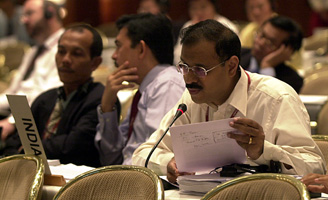
India
makes an intervention
|
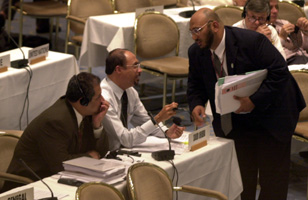
Delegates
from Saudi Arabia (left) consult with Kuwait
|
|

Delegates
from Nigeria
|
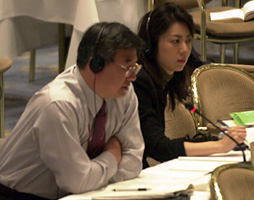
Delegates from Japan |
|
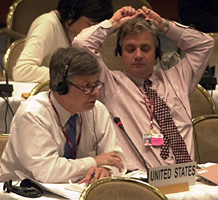
Harlan
Watson and Trig Tally, US
|
|
 Listen
to: Listen
to:
|
| |
|
|
|
|
|

Janos
Pastor, Sustainable Development Coordinator (left), and SBI
Chair Daniela Stoycheva (center) with other members of the
Secretariat
|
|
SBI
Subsidiary
Body for Implementation
|
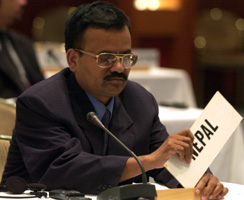
Nepal
|
|
The SBI met in the afternoon
to take up, among other things: non-Annex I financial matters;
capacity building; UNFCC Article 6 (education, training and
public awareness); national communications; and a request
by a group of countries of Central Asia and the Caucasus,
Albania and the Republic of Moldova (CACAM) regarding their
status under the UNFCCC.
 On
capacity building, listen to: On
capacity building, listen to:
|
|
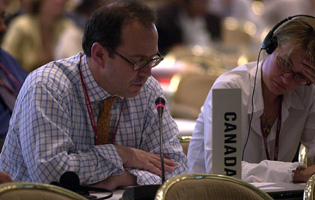
David
Drake, Canada, intervenes on capacity building
|
|
 Regarding
Article 6 of the Convention, Jean Pascal van Ypersele (Belgium)
reported on the UNECE regional workshop, which resulted in
recommendations on six key areas on the implementation of
Article 6 at national and international levels, including
formal and non-formal education on climate change and the
need for public awareness. Listen to: Regarding
Article 6 of the Convention, Jean Pascal van Ypersele (Belgium)
reported on the UNECE regional workshop, which resulted in
recommendations on six key areas on the implementation of
Article 6 at national and international levels, including
formal and non-formal education on climate change and the
need for public awareness. Listen to:
|
CONTACT
GROUPS
Contact groups were held on: the programme budget for the biennium
2004-2005; implementation of UNFCCC Article 4.8 and 4.9 (adverse
effects); Protocol Articles 5 (methodological issues), 7 (communication
of information) and 8 (review of information); the IPCC TAR;
research and systematic observation (R&SO); policies and
measures (P&Ms); and capacity building.
|
|
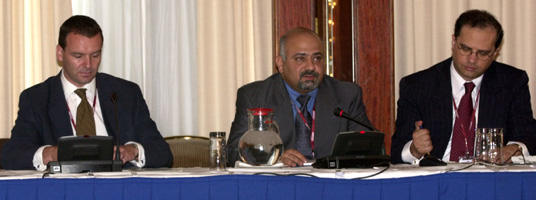
Contact
Group on implementation of Article 4.8 and 4.9 of the Convention:
Co-Chairs
Robert Mason, UK, and Fadhel Lari, Kuwait, and Youssef Nassef,
Secretariat
|
Programme
Budget Group:
This contact group, chaired by John Ashe (Antigua
and Barbuda), presented a draft COP-9 decision containing
three options on the draft programme budget and indicative
scales for UNFCCC and Protocol activities.
|
|
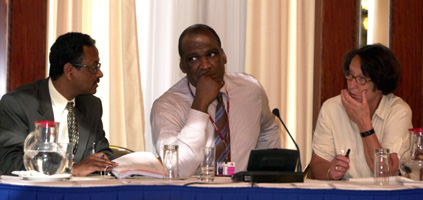
Programme
Budget Contact Group Chair John Ashe (center) with Asfaha
Beyene, Secretariat (left), and Joke Waller-Hunter, Executive
Secretary of the UNFCCC (right)
|
|
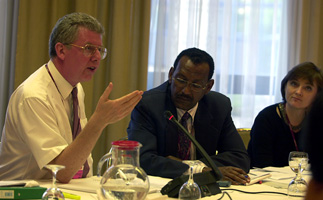
David Warrilow (UK) and Walid Al-Malik (United Arab Emirates)
|
|
Contact
Group on the Third Assessment Report of the Intergovernmental
Panel on Climate Change:
Participants
were presented with draft conclusions proposed by the Chair
and with elements for a draft decision. Delegates agreed
that they needed time to consider the documents and requested
the Co-Chairs to provide an overview of the documents. Co-Chair
Walid Al-Malik adjourned the meeting.
|

|

